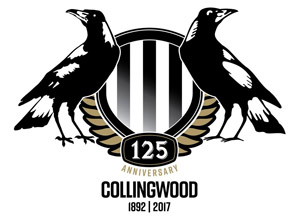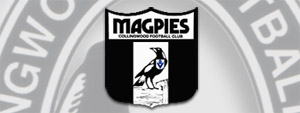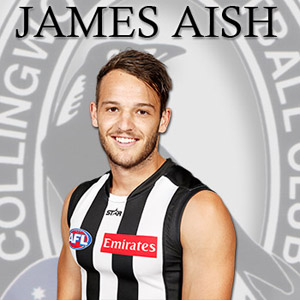Magpies Before McHale
Magpies Before McHale
by Mountains Magpie
Part One:
The legendary Jock McHale started with Collingwood in 1903 and then proceeded to coach the Magpies until 1949. McHale started coaching Collingwood in 1912 and had found himself in the unusual position of being coach yet having another player captain the side from 1914. Dan Minogue was in charge until 1916, Percy Wilson for the following two seasons, Con McCarthy in 1919 and Dick Lee in 1920, the year of McHaleŌĆÖs retirement as a player. McHale was captain/coach for 1912 and 1913. This article concentrates on CollingwoodŌĆÖs early history to 1912, prior to MchaleŌĆÖs coaching tenure.
The origins of our beloved Collingwood are shrouded in mystery but we do know the club was borne of the Britannia club. The Britannia club was in turn founded from Collingwood Juniors, a club founded in 1880. The residents of the suburb thought they should have a side in the VFA and Victoria Park was inspected to see if it met with the standards of the Association. Britannia was admitted to the VFA for the 1892 season and changed itŌĆÖs name to correspond with the suburb, Collingwood. Britannia played in a junior competition but upon promotion had to change itŌĆÖs colours from red white and blue (the colours of the VFAŌĆÖs Footscray) to the now famous black and white. Collingwood played their first game against Carlton on 7th May, starting a tradition that continues to this day. It is worth noting the only two clubs who have contested every season in the VFL/AFL are Collingwood and Carlton. The Magpies finished last in 1892 with three wins (against Williamstown, St Kilda and Carlton) but by 1896 claimed their first premiership, defeating South Melbourne on 3rd October. This is one of the fastest turnarounds from admission to premiers in football history, just five seasons. The captain of the premiers was Bill Strickland, who arrived in 1893, ironically from Carlton. Another name synonymous with Collingwood joined the club as secretary in 1895, Ern ŌĆ£BudŌĆØ Copeland. Our best and fairest award, instigated in 1927, honours Copeland who served as our secretary for 29 years.
Collingwood was one of the clubs to push for a breakaway competition and subsequently were admitted to the newly formed VFL in 1897. Highlights of CollingwoodŌĆÖs first season in the VFL included a first up win, by 25 points, against St Kilda and problems finding steerage to Geelong, a journey which required the club to take itŌĆÖs own meals aboard. Collingwood finished third in the inaugrual VFL season, with Strickland as captain (his only season in the new competition) and Archie Smith as our leading goalkicker with 15 majors. Smith debuted for Collingwood in 1892.
Collingwood finished third in 1898, with Bill Proudfoot, (who had debuted the previous year) as captain and Archie Smith again topping our goalkicking, and that of the VFL, with 31. Slipping a rung, the Magpies finished fourth in 1899 with Proudfoot replaced by Dick Condon as captain and Smith again bagging the most goals, with 17 for the season. A notable debutant this season was Bob Rush, but more of him in part two. In 1900 Collingwood finished fourth again, with Condon as captain and Smith, for the fourth consecutive season, heading the goalkicking list with 21. Only five players have equalled or bettered CollingwoodŌĆÖs goalkicking for four or more consecutive seasons, Dick Lee, Gordon Coventry, Peter McKenna, Brian Taylor and Saverio Rocca.
Magpies Before McHale ŌĆō Part Two
With the birth of the twentieth century, we find Collingwood advancing to their first of many Grand Final appearances. Regretfully, the result did not fall the Magpies way with Essendon winning by 27 points, with CollingwoodŌĆÖs two goals for the match (both scored by Robert Bryce) coming in the third quarter. One of CollingwoodŌĆÖs centremen in the Grand Final team was a Peter Martin, who was killed in the First World War. Bill Proudfoot resumed the captaincy for this season with Ted Rowell leading the goalkicking with 31in his debut season for the Magpies.
In 1902, Collingwood went one better and secured their first VFL premiership, reversing the result of 1901 by defeating Essendon by 33 points. Rowell again headed the goalkicking with 33 goals. Collingwood appointed Lardie Tulloch as captain for the 1902 season, a position he would hold for a further two years. Upon returning from a mid season tour of Tasmania, the Magpies unveiled a deadly new weapon, the stab kick. On their return to Melbourne on a Saturday morning it was used to great effect in beating Geelong that afternoon. Needless to say, most clubs had learned this new tactic by the end of the regular season, with Fitzroy beating us at our own game in the first semi-final. Charlie Pannam became the first VFL player to play 100 games in 1902. He debuted for Collingwood in 1894 and his brother, two sons and two grandsons all turned out for Collingwood in subsequent years.
Collingwood emulated FitzroyŌĆÖs feat of back to back premierships in 1903. Edward Lockwood headed the VFL goalkicking with 31 majors after crossing from Geelong the previous season. In round 1, Jock McHale, from Coburg Juniors, made his debut against Carlton. In round 4, Collingwood played Fitzroy, for competition points, at the Sydney Cricket Ground on 23rd May. Unfortunately, the ŌĆśRoys were too good this day, defeating the Magpies by 17 points in front of 5000 spectators. In one of the more amusing tales in VFL history, Bill Proudfoot, a policeman, played in the finals under the alias ŌĆśWilsonŌĆÖ. The police force had banned its members from playing football but changed the rule early the following year. It is worth noting that Collingwood also finished minor premiers in both 1902 and 1903.
Chasing a rare hat-trick, Collingwood finished 3rd in 1904, eliminated by eventual premiers Fitzroy by 11 points in the second semi-final. This season saw the appointment of Bill Strickland as the first coach of the Magpies, albeit late in the season. Charlie Pannam, with 24 goals, was the clubŌĆÖs leading goal scorer.
In 1905, Collingwood entered their fourth Grand Final in five years. After finishing as minor premiers, the Magpies lost their second semi-final to Carlton but advanced to the grand final with the ŌĆ£right of challengeŌĆØ that the minor premiers of the day enjoyed. Again losing to Fitzroy, this time by 13 points, the Magpies could only manage 2.5 for the day. Charlie Pannam was again the leading goalkicker with 38 as well as being captain for 1905, with Dick Condon as playing coach, a position he retained for the following season.
Collingwood finished third in 1906, defeated in the first semi-final by arch enemy and eventual premier Carlton. The legendary Dick Lee debuted in round 7, 1906 and led CollingwoodŌĆÖs goalkicking with 35. Lee would head the Magpies goal scorers for the following four years. Arthur Leach, the older brother of Edward and the enigmatic Fred, was appointed Captain during 1906 and held the position for the following season. He debuted for Collingwood in 1898. Bill Proudfoot played his last game for Collingwood in 1906 and a player named Thomas Nelson played his entire 3 game career this season. Nelson is immortalised with penning new lyrics to the Boer War song, Goodbye Dolly Grey, giving us our club song, Good Old Collingwood Forever.
Magpies Before McHale ŌĆō Part Three
Ted Rowell was appointed coach of Collingwood for the 1907 season and coached the following year also. Dick Lee kicked 47 goals in 1907 and 54 goals the following year.
The Magpies finished fourth in 1907 and 1908. Charlie Pannam (179 games) and Jack Monohan (171 games), both pivotal players, left the nest in 1907. Pannam would emerge the following season as RichmondŌĆÖs captain in their inaugural season and Monohan became a goal umpire.
In 1907, Collingwood were eliminated in the first semi-final by ultimate runners-up South Melbourne by 34 points. History repeated itself the following year with Essendon knocking out the Magpies, again in the first semi-final, by 35 points. Essendon finished runners up to Carlton, who thus completed the first hat-trick of premierships in the VFL. The little known Edward Drohan was appointed Captain for the 1908 season. He had crossed from Fitzroy for the 1903 season and retired in 1908 after 96 games for Collingwood. He became a field umpire the following year. Also in 1907, in yet another first, the uniforms of the Collingwood players were altered exposing their bare knees. The loose shorts and long socks apparently shocked the football world.
In 1909, George Angus was handed the coaching duties, a position he kept until the 1912 season, when he was replaced by Jock McHale. Angus was captain-coach for 1910 and 1911 but in 1909, in his last season at Collingwood, Bob Nash was made captain. Dick Lee again headed the goalkicking with 58 gaols. Collingwood finished third in 1909, beaten by 21 points in the second semi-final by eventual premiers South Melbourne.
Dick Lee headed the goalkicking for a fifth straight season in 1910, again with 58 majors. This was the fourth time in a row Lee had topped the VFL goalkicking and he would go on to repeat this feat another 6 times, from 1914 to 1917, 1919 and 1921. He thus topped the VFLŌĆÖs goalkicking on ten occasions, a record that will surely never be broken.
In this season, former player and then treasurer Bob Rush coined the Collingwood motto, ŌĆ£Floreat PicaŌĆØ. Translated, this means ŌĆ£May The Magpies ProsperŌĆØ. And prosper they did, securing their third VFL premiership, defeating their most famous rival, Carlton, by 14 points.
By all accounts, this Grand Final was just as violent as the infamous ŌĆ£bloodbathŌĆØ Grand Final of 1945. Les ŌĆśFlapperŌĆÖ Hughes was decked before the game started, with Richard Daykin then knocking out HughesŌĆÖ attacker. An all-in brawl erupted in the fourth quarter, which by the accounts of the day would still be going on if the umpire had not blown his whistle and bounced the ball. CollingwoodŌĆÖs Tom Baxter and John Shorten were reported and were given hefty sentences, Shorten for a season and a half (28 matches, the longest suspension ever handed to a Collingwood player) and Baxter for a season. In a final twist, BaxterŌĆÖs suspension was cancelled when CollingwoodŌĆÖs Daykin wrote to the VFL claiming it was he and not Baxter that had been involved in the melee. The league accepted DaykinŌĆÖs story and he was let off entirely as a reward for his courage.
In 1911, Tom Baxter kicked 31 goals to head CollingwoodŌĆÖs goalkicking. The Magpies finished fourth on the ladder but won their way into the Grand Final after defeating South Melbourne by 30 points in the first semi-final. Essendon were comfortably minor premiers but only beat the Magpies by a goal in the Grand Final. In the last quarter, Baxter twice kicked into the man on the mark, and also missed another three easy chances, and was cleared to St Kilda the following year. The Magpies would have to wait a long 79 years before they exacted revenge on Essendon in CollingwoodŌĆÖs only premiership in the modern era.
In the 15 seasons from 1897 to 1911, Collingwood never finished below fourth position, truly a remarkable feat for any club. They contested 6 Grand Finals for 3 premierships and their players led the VFLŌĆÖs goalkicking in 8 of those 15 seasons.




